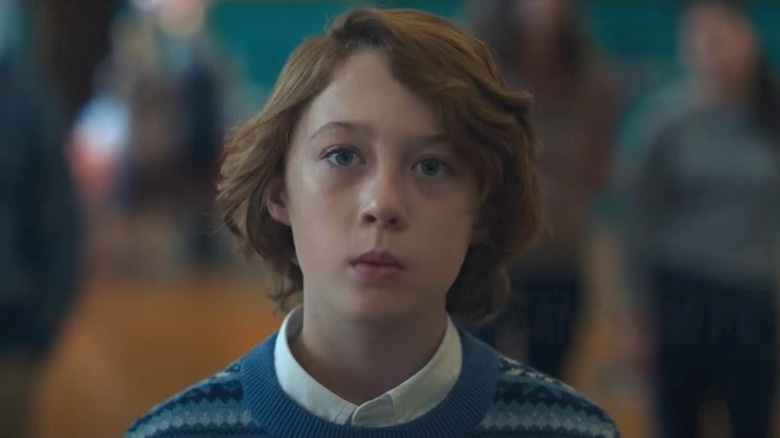
"Armageddon Time" is the latest dramatic entry from writer/director James Gray ("We Own The Night," "Ad Astra"). A film based on Gray's own childhood, "Armageddon Time" follows Paul Graff (Banks Repeta), a Jewish boy whose artistic aspirations conflict with his family's well-meaning emphasis on aiming him at a "respectable" occupation. Paul becomes friends with a less economically privileged but hopeful boy named Johnny (Jaylin Webb), before the pair are separated when Paul is sent to his brother's conservative private school on the eve of Reagan's America.
It's a film that tackles issues around racism and the American Dream through a variety of lenses, with excellent performances from Anne Hathaway, Jeremy Strong, and Anthony Hopkins as well as its young stars. (Read our review here.) In a new interview, I spoke with James Gray, Banks Repeta, and Jaylin Webb about the film's origins, the challenges of using your own life history as cinematic fuel, working with Anthony Hopkins, and more.
'The Thing Starts To Take On The Feeling Of A Ghost Story'
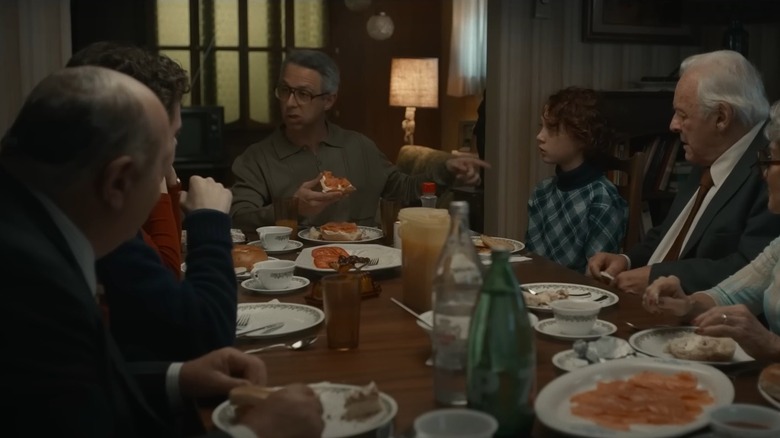
This interview was lightly edited for brevity and clarity.
"Armageddon Time" is so interesting because this is not just an autobiographically inspired tale for you. It also takes place when the U.S. is at a really pivotal historical moment in a number of ways. How did you land on this story, and choose a lens into these moments?
Gray: I have a rather irritating habit, or at least I had a rather irritating habit, of telling bedtime stories to my children. They are now a little bit too old to want them, or to care about them, or to like them. [To Banks and Jaylin] As you guys know -- you've hung out with them -- they're too cool for school now. But back in the day, maybe five or six years ago, I was doing it all the time.
They tended to weirdly like the ones that didn't always have a happy ending. At one point they said, "Dad, we want to see where you grew up," so my wife and I drove across the bridge and took them to Queens Boulevard, and showed them my old house. They were very surprised at what it looked like, and a flood of memories did come back to me. A very melancholic feeling came back, because you realize that all these people who meant so much to you, [and who] were so important, and all these dinners that were so critical in that house, they're all gone. All of a sudden, the thing starts to take on the feeling of a ghost story.
I just realized that, when you're growing up, there are inflection points. There are turning points, and sometimes there are experiences you have that don't always turn out all right. [They] don't always shape you for better, don't always make you a better person, don't always teach you a lesson, but [they] give you a view of the world that is more complex, more mysterious, more daunting, and more frightening than you originally thought the world was. I chose it for those reasons. That, to me, was a better challenge dramatically than, "I learned my lesson and became a better person." No, no. This felt very different to me, and dramatically more challenging to be honest about it.
'It Was The Closest Thing We Have To A Time Machine'
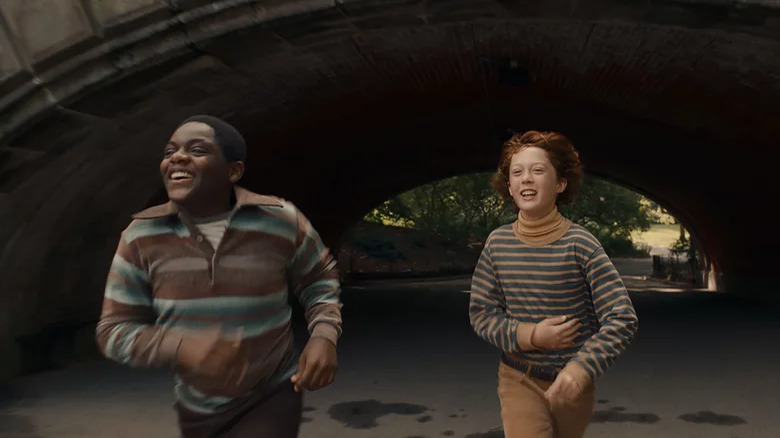
Jaylin and Banks, both of you were so good in the film. Since the film is essentially autobiographical for James, with Banks playing his younger, fictionalized self, what it was like to work with him and on your characters?
Repeta: James gave both Jay and I some basic information, like what the music was like, how it was in Queens, and how it was in the 1980s. But besides that ... the question was how we worked on our character, is that correct?
Yeah, that's a big part of it.
Repeta: When you walk on set, it was so close to the 1980s, which both Jay and I have not lived [in] before. It really gave you a sense of what it would be like, and that helped me drop into Paul.
Webb: I agree with that. Banks and I, we got a lot of help. Becoming Johnny was definitely not something that I did all by myself. I had a lot of help and guidance just trying to connect to this character, and when we were filming we were in this '80s environment that, as Banks said, we haven't lived before.
Repeta: Happy Massee, the production designer, really gave a feel for that.
Webb: Yes.
Gray: It was a little bit of a time warp. It was the closest thing we have to a time machine. We don't have a time machine. What we have are period movies and TV. ... That's the closest we've got, the closest we'll ever get.
'You Have Actors Who Bring Their Own Magic To The Party'
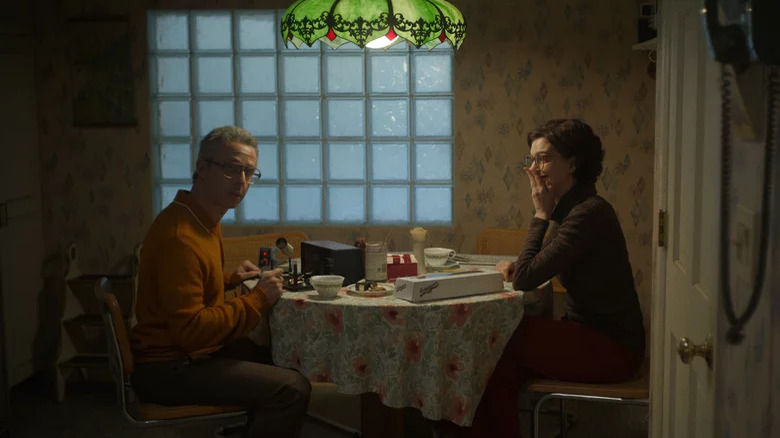
James, for "Armageddon Time," you're telling a story that's inspired by your own experiences, so obviously there's a blend of real-life inspiration and creative license. How true to your own experience is the final narrative? And how did you walk that line and decide what to incorporate and what to create?
Gray: Well, you're quite right, there's always a degree of ... not fudging, that's not the right word, but ... for example, the real stories probably took over about a year and two or three months of a school year, and maybe of the summer. You have to do a little contraction or else you're making 900 hours of programming, and I'm not sure how interesting that would be. Two hours of me is probably too much for some anyway as it is, so you have to say it's a two-month period as opposed to a year and two months. All of a sudden, the events get more compact. And a couple of things happened with a friend of mine, that wasn't the Johnny figure, that I included. A couple of things happened to my brother that didn't happen to me that I included. They're not composites [however], it's very close to the facts on the ground. I won't lie.
It's not a documentary. It's going to become a fantasia on your life no matter what you do, because you have actors who bring their own magic to the party. If I try to force these guys to play, "No, say it exactly the way I said it in 1980" or whatever, then something interesting is not going to emerge. Something beautiful is not going to emerge, it's going to be jerry-rigged. It's going to feel staged and fixed. I wanted these guys not to play imitations of my friends and me, but rather to see it in a broader view, to find the soul of a character. The facts are pretty close, they are, but I would say that the difference mostly is in the consolidation of the timeframe, because that was the hardest thing. I mean you're talking about fifth and sixth grade, really, not just sixth grade.
I'm always interested in those decision points. I appreciate that.
Gray: Well, it's not easy! They're not easy to do. Hitchcock used to say that "movies are life with the boring parts cut out of it," but then you have to judge, "What does everybody else think is boring?"
'They're Both Dreamers'
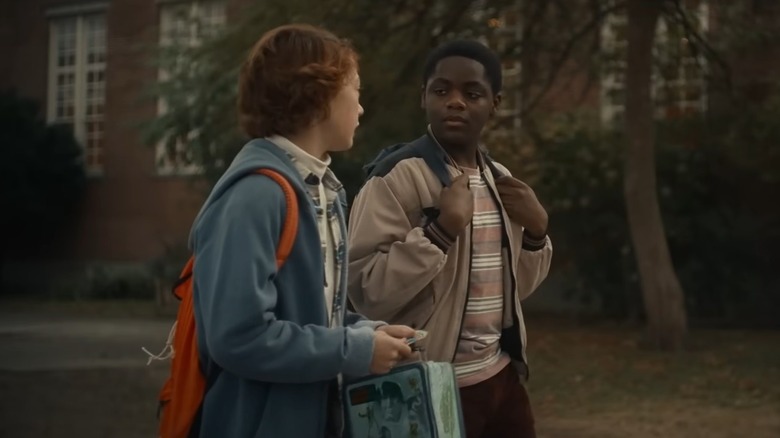
Jaylin and Banks, your characters, Paul and Johnny, are so interesting in that they're both on the outside in their own ways, and then they really latch onto each other even though their personalities and their backgrounds are very different. Talk to me about your characters' friendship in the film and developing that.
Webb: Well, even before we started filming, Banks and I got to start to build our friendship in school with our other castmates. We found out that we had a lot in common. We explored New York together and throughout filming ... Johnny and Paul, they're both dreamers, they both have these dreams. Johnny saw a man go to space and he thinks that he can do the same thing, and he sees Paul as also a dreamer. I feel like there's just something about Paul's personality that really attracts Johnny, and [when] he sees him, he's like "Hey, this kid is cool," and I think that really helps. That right there has to be the start of their friendship, which leads to them doing a bunch of things together throughout the film.
Repeta: Jaylin kind of said it all. I think one of the biggest similarities between Johnny and Paul is that they're both really big dreamers and they have these ideas of going to space, or becoming an artist, or all of these big things. The thing that makes their relationship special is that they don't care about where they come from, they just like each other as friends, and it's a good thing.
Gray: I would add this if I may, which I'm allowed to say because I did it: They're both nerds.
Repeta and Webb: [Simultaneously] Yeah.
Gray: In the best sense, right? "I have these Apollo mission patch stickers." "Oh that's so cool." They connect on a nerd level, that's what I always thought. I connected with them on a nerd level.
Repeta: [Joking] I'm too cool to say that, so ... I'm kidding.
Gray: No, it's all right. You can get away with it.
'It's My Attempt To Reveal Myself With As Much Honesty As I Can'
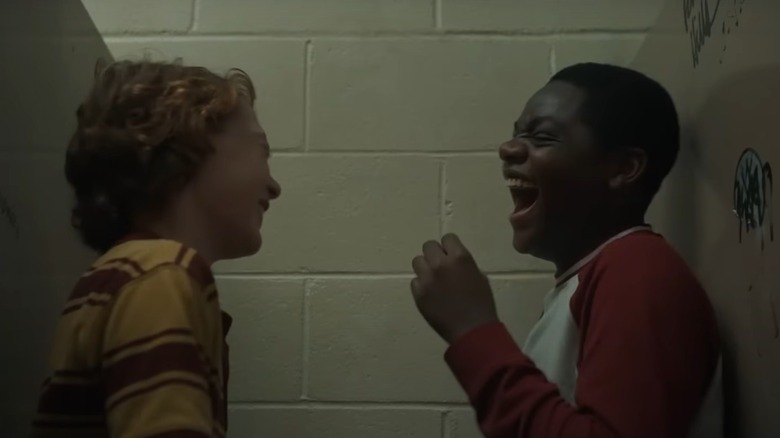
I love "Ad Astra," and even though it's very different from "Armageddon Time," it's interesting that both wrestle with strained father-son relationships. I'm so interested that theme recurred, and I wanted to ask you about that.
Gray: I suppose that some of it comes from my own life, but it's also a very elemental thing in Western culture, right? I mean, the Oedipus myth always pits the son against the father, and your father is usually the second person whom you meet in the world, behind your mother. I just see it as a very mythic and basic story idea around which to base a drama.
But also, of course I have a personal connection to it. I mean, my relationship with my father was, in the end, positive, but it was also complex and fraught, much as many relationships are, most relationships are. So, I suppose it's my attempt to reveal myself with as much honesty as I can. In really all the films [one makes], you don't say, "Oh, this is a movie I'm just going to make for money, and get a nice house in the south of France out of it" or something. My attitude is always, "How do I put myself into the work? How do I reveal a part of me that I'm actually not comfortable with?"
To me, that's the job of the artists, the job of the actors, the job of the director: show you what I am not happy about. That's dramatic. I show you what I'm happy about, who cares? I like biscotti, let me just eat some biscotti. Want to watch that? No, I want to watch what is uncomfortable.
Anthony Hopkins 'Is The Best That I've Seen At Breaking Down Any Barrier Between The Actor And The Character'
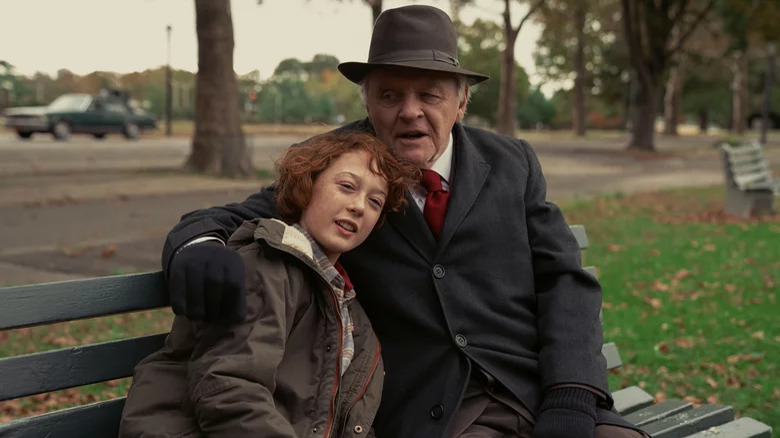
Banks, you were in so many excellent scenes with Anthony Hopkins. For you and James, what was it like working with him?
Repeta: It was great. I think one of the things that made a real chemistry on [the] film is that outside of it, I got to actually do some fun things with him. He was very fun and calming, and it wasn't weird to be around him. We learned to salsa dance together, and I really enjoyed working with him. He taught me a lot of wise things.
Gray: Well, he is a master, that guy.
Repeta: He's Anthony Hopkins.
Gray: He's Anthony Hopkins. Exactly. He is the best that I've seen at breaking down any barrier between the actor and the character. You don't see the work, he just is. He is being in the scene. He's not acting, he's not putting on a show. He is expressing part of himself, and he really connected to the movie.
He loved Banks, by the way. [To Banks] He told me that, maybe I didn't tell you. [To me] But he really connected also to the part, because he had a very special relationship with his grandfather, who died in very unsentimental and similar circumstances. Just said "goodbye," and the next thing he knew his grandfather was dead. And his grandfather was the one person who told him he was wanted. So all these things went into a very personal identification he had. Plus he has Banks, whom he loved. Unfortunately, Jaylin didn't get a chance to work with him. But he has a magic, that guy. He's really right up there with anyone.
Webb: Adding on to what James said, I didn't get the chance to work with Anthony Hopkins, but I remember I was done filming one day, and I had just done an interview, and when my mom and I were walking out, we saw Anthony right there. So, there my mom is, she wants me to go up to him and say something to him, but I remembered before that he was in movies where he ate people. That really kind of freaked me out, so I chickened out and just ran out.
Gray: You never talked to him?
Webb: No, and to this day my mom is still so mad about it, but I just got so scared.
Gray: That's hilarious, I didn't know that. Where was that? In the movie theater?
Webb: Yes, it was. Exactly, Exactly.
Gray: Oh my God, you never wound up meeting?
Webb: No.
Gray: I wish I'd known that, I would've brought him over. I was probably doing something on the street, right? I was working. Wow. I wish I'd known that. That's hilarious.
Repeta: I love how matter-of-fact you said it.
Gray: Yeah.
Repeta: "Movie where he eats people."
Webb: What is it called? "Hannibal?"
Gray: He plays a character, Hannibal Lecter.
Repeta: "[The] Silence of the Lambs."
Gray: "[The] Silence of the Lambs," that's right.
When you're old enough to watch "[The] Silence in the Lambs" responsibly, you will really like it. It is scary, but it's great. Thank you all for sharing your moments with Anthony, and for your time.
"Armageddon Time" begins a limited U.S. release today before rolling out nationwide on November 11th, 2022.
Read this next: The Best Movies Of 2022 So Far
The post Armageddon Time's James Gray and Actors Banks Repeta and Jaylin Webb on Revisiting the Past [Exclusive Interview] appeared first on /Film.
0 Comments